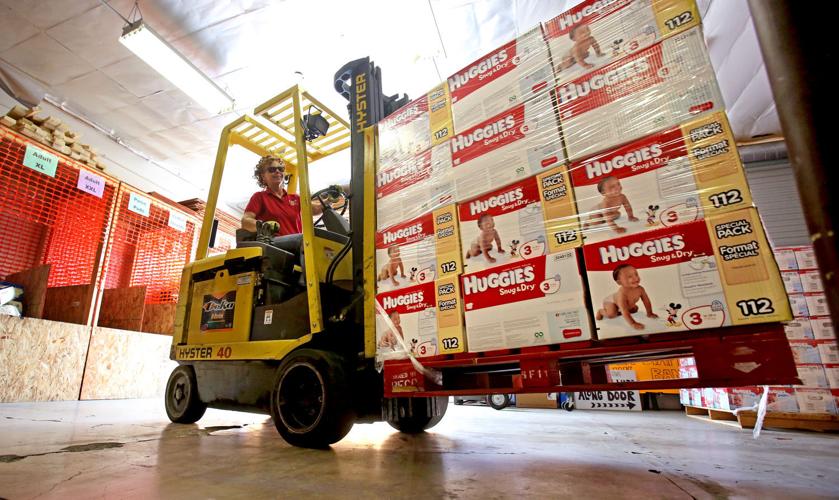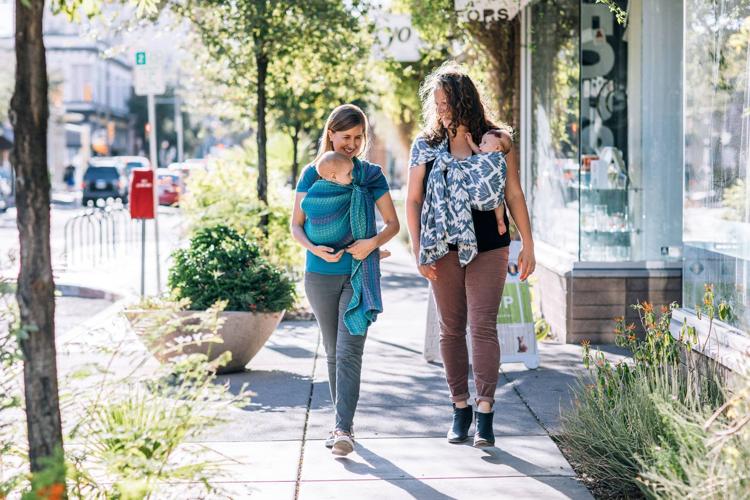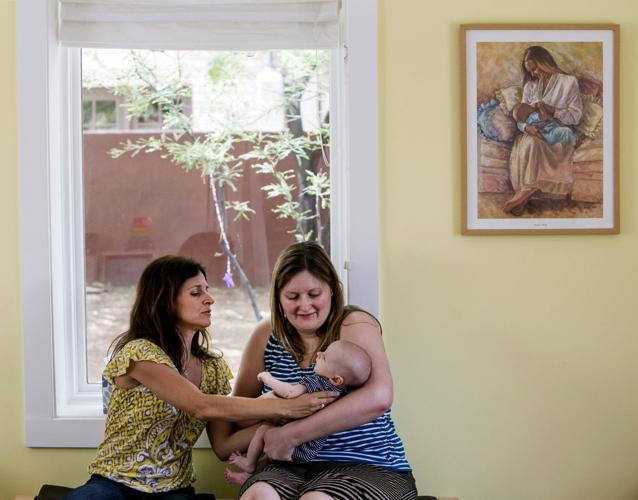Editor's note: This story was last updated on May 18.
Figuring out what to expect when you're expecting is hard enough when life is normal.
But now, with the COVID-19 pandemic, expecting and new mothers have additional challenges to navigate, all while learning about pregnancy and parenting. Visitors are limited during delivery and new parents adjusting to caring for an infant are isolated. This is hard.
The Centers for Disease Control and Prevention says that at this point, we don't know whether pregnant women are more likely to contract COVID-19 or have more extreme symptoms. Changes in the immune system during pregnancy can cause other illnesses — such as influenza — to pose a greater risk to pregnant women, though the CDC notes that so far, existing information indicates that pregnant people have the same level of risk for COVID-19 as other adults.
As the spread of the novel coronavirus continues to cause concern in people across the globe, parents-to-be are especially anxious about how the virus will impact their pregnancy and their newborns.
Although some of the traditional support you would normally receive during this time is limited, there are still (mostly virtual) resources out there to help you get through this.
And, we should note, please take your questions and concerns to your doctor or care provider. They can help you make wise decisions and access the resources that will best support you and your baby.
If you're an organization providing services and support to new and expectant moms and want to be added to this guide please let us know by sending us an email.
If you're considering a midwife
Olga Ryan, the director of Babymoon Inn of Tucson, a freestanding birth center that should open later this year, says that she has seen a increase in women calling to learn about birth options that avoid hospital visits.
"Community birth providers from across the U.S. are hearing from families at a higher rate," says Ryan, who worked at the El Rio Birth and Women's Health Center from 2006 until 2019 when the birth center moved into Tucson Medical Center and became the Midwifery Center at TMC.
Do your research, take tours if possible and ask questions of the healthcare providers you're considering. A woman interested in the midwifery model of care, for example, would need to have a consultation to make sure that was a safe option.
"If you're coming to us because you're worried about what you might be exposed to at the hospital, we can walk with you through this, to see if we can't help families feel like they're going to be safe," Ryan says.
She also points out that if you had been planning a hospital birth before the pandemic, don't immediately jump to change your birth plan. She's more than happy to speak with women considering their options but adds that "when a woman has been planning a hospital birth with a physician and epidural and all of those things, to have all of that stuff come off the table, it may feel less-than for her to try to establish a relationship with a midwife and team ... And that's not an ideal way to go into the situation."
Plus, it's important to note that Tucson hospitals are implementing procedures to reduce the risk for mom and baby. Talk to your doctor.
• Babymoon Inn of Tucson is a freestanding birth center and the second location of Babymoon Inn Phoenix, an accredited birth center in Phoenix. Ryan says the Tucson location should open later in 2020 and will be accredited too. They are already accepting prenatal patients. The birth center has one midwife on staff right now. To cope with coronavirus, Ryan says they're using telehealth appointments when possible and trying to schedule lab tests and ultrasounds with other necessary appointments to limit in-person exposure. Visit babymooninn.com/tucson.
• El Rio Health Center has several certified nurse-midwives who see patients at El Rio clinics and deliver babies at the Midwifery Center at TMC for Women. Greta Gill who is the director of the Midwifery Center and also a certified nurse-midwife at El Rio says while there has been an increase in midwife-attended births in Arizona in recent years, she hasn't seen a surge in women switching providers to work with a midwife due to the pandemic. Gill says El Rio midwives continue to meet with women in person when needed but are also spacing out in-person visits with virtual visits and telephone contact with patients and consolidating services into fewer appointments to maintain social distancing. "When women feel comfortable, we're doing their initial prenatal visit as a virtual visit to take their history and listen to their concerns and then make a plan of care so that when they need to come in — for an in-person exam diagnostic test, which is an ultrasound or lab tests — those things can be consolidated and done in an efficient way rather than multiple contacts in a health center."
Deona Bien, director of patient care and women and children's services at TMC, says many pregnant women have been asking about the visitation process during labor. As of the end of April, women who are delivering at TMC or the Midwifery Center and think they are going into labor are being triaged alone. Once they are admitted one support person can accompany them for the duration of their stay. Bien says the hospital and center have set up services so that the support person doesn't have to leave the room and can have items that patients might need brought up to their room.
Women who have low-risk, healthy pregnancies who give birth at the Midwifery Center have the option to go home the same day or stay an extra day. Gill says in the last few weeks more women have opted to go home the same day and have their follow-up appointments in an outpatient setting. El Rio also accepts transfers to its nurse-midwives from women in all stages of their pregnancy if they have already been receiving regular prenatal care and are not high risk.
• Northwest Medical Center has midwives who deliver at the hospital's Women's Center. They are employed through Marana Health Center Healthcare, says Veronica Apodaca, a spokesperson for the hospital. Since the Women's Center has temporarily halted tours, reach out to MHC Healthcare to establish care.
• In Arizona there are two types of midwives allowed to legally help you deliver your baby: A licensed midwife and a certified nurse midwife. Search the Arizona Department of Health Services database for all licensed midwives in the state and the American College of Nurse-Midwives.
If you want a doula or other one-on-one support

Doulas offer support and guidance to women during each stage of their pregnancy journey including prenatal, perinatal and postpartum support, usually done in-person in one-on-one meetings or group sessions. Local doulas are quickly adapting to make changes to their services that support social distancing by offering virtual support, limiting in-person services and cancelling group sessions. Current hospital policies only allow one support person to accompany a woman during labor, so doulas are finding ways to support their clients even if they can't physically be with them during labor.
• Desert Bloom Doula, run by Rhonda Anderson, is offering virtual services including prenatal meetings, email and text contact and childbirth education classes via powerpoint with video chat follow ups for questions. Anderson is also facilitating her weekly perinatal support group online and using a video platform to provide labor support for her clients while they are in the hospital. "I can offer her and her partner suggestions for comfort measures and labor positions if needed and hopefully just be a calming presence in the midst of laboring in such a stressful time," Anderson said via email. More information about Anderson's services can be found on the Desert Bloom Doula website, or you can email Anderson directly at rhonda@desertbloomdoula.com
• Elizabeth Mendoza, a Tucson doula who runs Wisdom Within, typically offers in-person Lamaze childbirth preparation classes and doula services. But with social distancing measures in place, Mendoza has finished preparation sessions with existing clients via Zoom and FaceTime. "I continue to provide one-on-one virtual support to pregnant and postpartum doula families with the understanding that hospitals are not currently considering doulas to be essential enough to be present during births," Mendoza said in an email. " Because of these new policies, conversations with clients and support people have really centered around how to advocate strongly for yourself in our new 'normal' with new rules and expectations, how to navigate your birth experience when it might not go according to your ideal plan, and tips and tricks for partners to really step forward and shine as the stellar birth supporters they are." More about Mendoza and her services can be found on the Wisdom Within website.
• Tucson Doulas is an agency that serves clients in Southern Arizona and is offering several virtual childbirth education classes as well as classes for grandparents. Owner Angela Horn says typically the agency's doulas meet with clients in their home, but they are now using a secure video chat platform to meet with clients and to provide labor and postpartum support. "We have also been providing in-person labor support when our client has no other support person available to them or when clients choose to have their doulas as their one visitor for the duration of their hospital stay," Horn said in an email. Doulas are also checking in with their clients who have recently given birth twice a day via video. "These twice a day visits allow us to identify red flags, assist with teaching infant care and to help clients address any feeding issues they may encounter. By seeing our clients virtually each day we are able to better identify any mental health red flags as well as connect our clients who need it to mental health support that is also provided virtually," Horn wrote. More information about Tucson Doulas can be found here.
• The Pima County Health Department has free home visiting programs for pregnant and new moms with children younger than 2. Both the Nurse-Family Partnership and Health Start offer education on healthy pregnancies, child development, breastfeeding and more, according to Jessica Dalton, the Nurse-Family Partnership nurse manager. All home visits are being done via telephone and video chats. To be eligible for the Nurse-Family Partnership program and be partnered with a nurse until the child's second birthday, you must be less than 28 weeks pregnant with your first child and live in Pima County. To be eligible for the Health Start program and be partnered with a community health worker until the child's second birthday, you must be pregnant or postpartum with a child under the age of 2 and live in Pima County. For more information, you can call or text Dalton at 520-247-8630, visit pima.gov/newmoms or email parentsupport@pima.gov.
If you need help breastfeeding

Jen Klaus, right, gets a helping hand with her baby, Finn, from breast-feeding specialist Nina Isaac at Milk & Honey.
Crissi Blake, a registered nurse and a co-owner of Milk and Honey, a breastfeeding and postpartum center, says that before the pandemic, moms could find a support group happening just about every day. Now, not so much.
"Moms need support, especially during this crisis," Blake says.
• Milk and Honey is still providing one-on-one lactation consultations through Zoom or over the phone. If an in-person meeting is required to assess or diagnose something that can't be done virtually, only one therapist is in the office at a time, Blake says. Moms can also follow Milk and Honey on Instagram for a support group via Instagram Live on Fridays from 10-11 a.m. This is a place to ask questions and get answers from an expert.
• Northwest Medical Center has transitioned its breastfeeding support group to Google Meet. The group is led by registered nurses with special training in lactation and a lactation consultant. The online group meets Wednesdays from 1-3 p.m. You don't have to be a Northwest patient to join. For more information or to get log-in information, email Helen.adami@northwestmedicalcenter.com.
• La Leche League Tucson is holding virtual meetings on Facebook and Zoom. Group leaders who have breastfed their own babies will provide support and information for interested parents. Join the Tucson La Leche League Facebook group, or visit lllofaz.org/tucson to contact group leaders and learn more. You can also call 520-789-6455 with questions.
• Tucson Medical Center is offering several childbirth and parenting classes online including sessions about breastfeeding, childbirth and newborn care. The classes are self-paced and are offered in English and Spanish. TMC also has a breastfeed warmline where all women can connect with a lactation consultant who can help with questions, concerns and guidance. You can call 520-308-6583, leave a message and a lactation consultant will return your call.
If you need diapers

The Diaper Bank of Southern Arizona provides disposable diapers for all ages.
• The Diaper Bank of Southern Arizona distributes diapers to families in times of need through its non-profit partners. A list of the partner agencies can be found here. "Each agency has its own eligibility requirements and distribution process, so it's best to call ahead and find out how to receive a free emergency supplemental supply," says Leslie Pike, manager of programs and volunteerism at the Diaper Bank. The organization also offers a cloth diaper starter kit for qualifying families. Pike says there's been an increased interest in cloth diapering during the pandemic. "Cloth diapering is an effective way for a family to budget their disposable supplies or eliminate the need for disposables altogether," she said via email. The Diaper Bank offers free cloth diapering webinars to help parents learn about cloth diapering and to find out how to qualify for a starter kit. The next webinar is happening on Friday, April 24 at 2 p.m., and Pike says to keep an eye on the Diaper Bank's Facebook page for future webinar dates.
• New Life Pregnancy Center, which is part of Arizona Baptist Children's Services, offers free diapers, wipes and other material resources every Tuesday and Thursday from 9 a.m. to 2 p.m. at the center at 1779 N. Alvernon Way. You can just show up at the center, or if you can't make it to the center during those days you can call 520-795-7541, says program director Desi Goodwin. Expectant moms can also receive a free layette bag with new diapers, clothing, blankets and other baby items one month prior to their due date, Goodwin says. The center also has baby items like strollers, hygiene items and bouncers that can be picked up by appointment.
If you're struggling with perinatal mood and anxiety disorders
Even in normal circumstances (ie: when there is not a pandemic), caring for perinatal mood and anxiety disorders is an important part of pregnancy and postpartum care. Be sure to talk to your care provider about your mood and how you're feeling to get specific resources.
• The Tucson Postpartum Depression Coalition has helpful information about what perinatal depression and anxiety feel like and how to get help. They also have a list of postpartum providers who can help you navigate this, including counselors and therapists, obstetricians and more. The coalition has also organized Zoom support groups with a reproductive psychiatrist Thursdays at noon. Pregnant and postpartum women can bring their questions and concerns. Visit the Tucson Postpartum Depression Coalition Facebook page for more information. For emergency situations, call the Crisis Response Network at 520-622-6000 or 911. NAMI Southern Arizona also has some helpful crisis information.
• The Arizona chapter of Postpartum Support International also has a gigantic list of local resources, organized by county. Find the Pima County section for references and contact information for people and organizations who can help. The organization also has a number of online meetings for perinatal mood support, military moms, NICU parents and more. You'll have to create a free account to join. You can also call an Arizona warmline for support for both pregnant and postpartum women at 888-434-6667. That's available in both English and Spanish.
• Refuse the Blues is a free, online class created by Jeanetta Bodie, owner of the Strong Mother Movement and a yoga teacher who focuses on prenatal and postpartum care. The class includes mindfulness practices, yoga, tummy exercises and more.
If you want to make some friends who get it

Joining a mom group is a great way to make new friends. Stephanie Springer, left and Kara Trowbridge met through the Tucson chapter of Babywearing International. The two said the group has expanded their mom circle.
Don't go at it alone.
Blake with Milk and Honey points out that typically, new mothers have their own mom or family member stepping in to help in the early days of a baby's life. But now, with social distancing measures, that's less likely.
"I think what can be tricky when moms are on their own with babies is everything feels really intense," Blake says.
• Northwest Medical Center's Mom-to-Mom support group is now online via Google Meet Wednesdays at 10 a.m. Talk with other moms about the ups-and-downs of pregnancy and motherhood. You don't have to be a Northwest patient to join. For more information or to get log-in information, email Helen.adami@northwestmedicalcenter.com.
• El Rio's Baby Love support group for parents of newborns through toddlers is meeting online on Zoom. Check the El Rio Birth & Women's Health Center Facebook page for upcoming meetings.
If you just really, really need some self care
Ryan with Babymoon Inn points out that in addition to the usual self care recommendations — eat well, get sleep, stay hydrated — she always tells people to make sure to play.
"Our brains are capable of working on a stressed out level longer than healthy, and that can impact critical thinking and decision making," she says. Play can help with that.
• The Strong Mother Movement has a Zoom postpartum yoga class every Sunday at 9:30 a.m. The class is $10 to drop in and will focus on the pelvic floor and lower ab connection.
• Oat Mama, a local, women-owned business, sells bars, teas and supplements to help with lactation. You'll also find teas for labor preparation, morning sickness and postpartum healing. Just remember to consult your doctor before using. If you're cooking at home, check out the Oat Mama cookbook "Eat to Feed," with recipes to help with breastfeeding. Visit oatmama.com for more information.
• Serena McRae, the local artist behind Cactus Clouds Art, has launched a beautiful deck of illustrated, hand-painted cards featuring affirmations to encourage moms. To pre-order Affirmations Moms Actually Need, a deck of these water-colored cards, pledge $40 on Kickstarter. You have until June 23 to pre-order.
• Also, for all of you expecting mamas, #ThisIsTucson's online shop has adorable, cactus maternity T-shirts for sale, plus baby cactus onesies. We're just sayin'....
• Tucson yoga instructor, Bonnie Golden is offering donation-based prenatal yoga classes on Zoom every Tuesday morning from 10-11 a.m. Participants will also get a recorded version of the class so they can continue practicing on their own.
If you're interested in other helpful resources
• Tucson Medical Center has a text message service called TMCMama where you can receive weekly texts with information and resources relevant to your stage of pregnancy. You can opt in by texting the word "TMCMama" to 888-988-7894 and you'll be asked to share how many weeks pregnant you are to set you up with the right information. If you have recently had a baby, you can also get weekly information about your baby's development by texting the word "TMCBaby" to the same number.
• New Life Pregnancy Center offers virtual prenatal and postpartum education classes and other life skill videos. Call program director Desi Goodwin at 520-795-7541 to request a list of classes. Typically the center offers these classes in person, where participants can earn credits to shop in its parent store.
• The Pima County Health Department's Women, Infants and Children (WIC) program is still providing personalized nutrition tips, breastfeeding support and healthy foods to families with infants and children younger than 5. Women who are pregnant, breastfeeding or whose pregnancy ended less than 6 months ago also qualify, according to Dalton. WIC eligibility includes receiving AHCCCS/SNAP benefits, earning less than 185 percent of the poverty guidelines and fostering kiddos. Prospective clients can inquire via phone. For more information, 520-724-7777 or visit azwic.gov.










